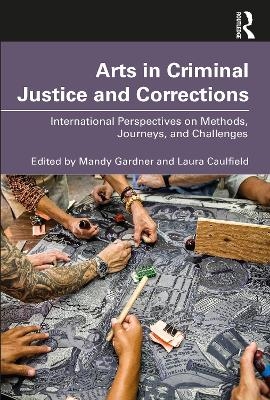
Arts in Criminal Justice and Corrections
Routledge (Verlag)
978-1-032-51297-6 (ISBN)
Offering a lively, international, and interdisciplinary introduction to research on arts programmes in prisons, Arts in Criminal Justice and Corrections is the first volume to bring together leading figures from the USA, the UK, Australia, New Zealand, and Belgium to explore key methodological approaches and issues through the lens of the researchers themselves.
Beginning with the original pioneers of research into the arts in corrections in the USA in the 1980s, this book highlights the role of researchers in evidencing impact and influencing policy. Contributors include those who were themselves once incarcerated and those who have transitioned from practitioner to criminologist. Chapters lay the groundwork for discussion on how an important avenue for rehabilitation and re-entry can be developed, providing a call to action for more research into a field which holds promise for building a more just, equitable, and inclusive society.
This book is essential reading for criminologists engaged in prisons, corrections, and desistance research, as well as researchers and practitioners in the arts and rehabilitation.
Amanda Gardner, PhD, is based in the USA and is the co-author of the Prison Arts Resource Project (PARP), the first annotated bibliography of all evidence-based research into US correctional arts programs. The project was funded by the US National Endowment for the Arts. She is also co-director of SCAN Correctional Arts Network, which houses the PARP and serves as a nexus for researchers and practitioners in justice-related arts. She has worked as an arts practitioner in alternative settings, including prisons, jails, and homeless shelters and is the recipient or co-recipient of four National Endowment for the Arts grants. She also has worked as a journalist and has published widely in consumer and academic journals, including the Journal of Prison Education and Reentry and Teachers & Writers. In her work as a community artist, she has edited and published several “zines” written by participants in her workshops as well as two editions of the Albuquerque Almanac, a collection of stories written by and about diverse members of the Albuquerque, New Mexico, community. Laura Caulfield, PhD, is Founding Chair of the Institute for Community Research and Development at the University of Wolverhampton, UK. Laura is a psychologist and criminologist and has written extensively on the role of the arts in criminal justice. Laura’s work has influenced the practice of arts programmes in the criminal justice system and has developed new methodological approaches in seeking to evidence the impact of the arts. She was involved in the design of the National Criminal Justice Arts Alliance Evidence Library, a repository for key research and evaluation documents on the impact of arts-based projects, programmes, and interventions within the criminal justice system. Laura is the author of two other books “Forensic Psychology” (2014, Pearson), and “Criminological Skills and Research for Beginners” (2014, 2018, 2025, Routledge).
1.Introduction and overview of arts in criminal justice and corrections
Mandy Gardner and Laura Caulfield
Part 1. The impact of the arts in criminal justice and corrections: What works, how it works, and why
2. New theoretical frameworks for designing and evaluating arts-in-corrections programs
Larry Brewster, Jack Bowers and Laurie Brooks
3. Developing methodologies to evidence the impact of the arts in criminal justice.
Laura Caulfield
4. Practice informs research informs policy informs practice informs... [ad infinitum]
David Gussak
5. A realist lens on participatory music programmes in prison
Silke Marynissen, Geert Vandermeersche and Dorien Brosens
Part 2. The researcher’s journey
6. Education research, vulnerability and positionality: a story of the methodological journey of an education researcher in prison
Jennie Henley
7. Collaboration as a tool for transformative justice: Writing, songwriting, and communal Singing
Mary Cohen
8. Autoethnography as a bridge to shared decision-making
Reginold Daniels and Mandy Gardner
Part 3. Foregrounding the people in arts spaces
9. Making the story count: An argument for the development of a narrative evaluation tool in the arts in criminal justice sector
Ella Simpson
10. On games and gamification: Understanding what’s a stake in co-designing with prisoners
Lorraine Gamman
11. Listening through walls: Enacting a politics of listening
Rand Hazou and Sarah Woodland
| Erscheinungsdatum | 23.10.2024 |
|---|---|
| Zusatzinfo | 1 Tables, black and white; 11 Line drawings, black and white; 22 Halftones, black and white; 33 Illustrations, black and white |
| Verlagsort | London |
| Sprache | englisch |
| Maße | 156 x 234 mm |
| Gewicht | 471 g |
| Themenwelt | Kunst / Musik / Theater ► Theater / Ballett |
| Recht / Steuern ► EU / Internationales Recht | |
| Recht / Steuern ► Strafrecht ► Kriminologie | |
| Recht / Steuern ► Strafrecht ► Strafverfahrensrecht | |
| ISBN-10 | 1-032-51297-0 / 1032512970 |
| ISBN-13 | 978-1-032-51297-6 / 9781032512976 |
| Zustand | Neuware |
| Haben Sie eine Frage zum Produkt? |
aus dem Bereich


